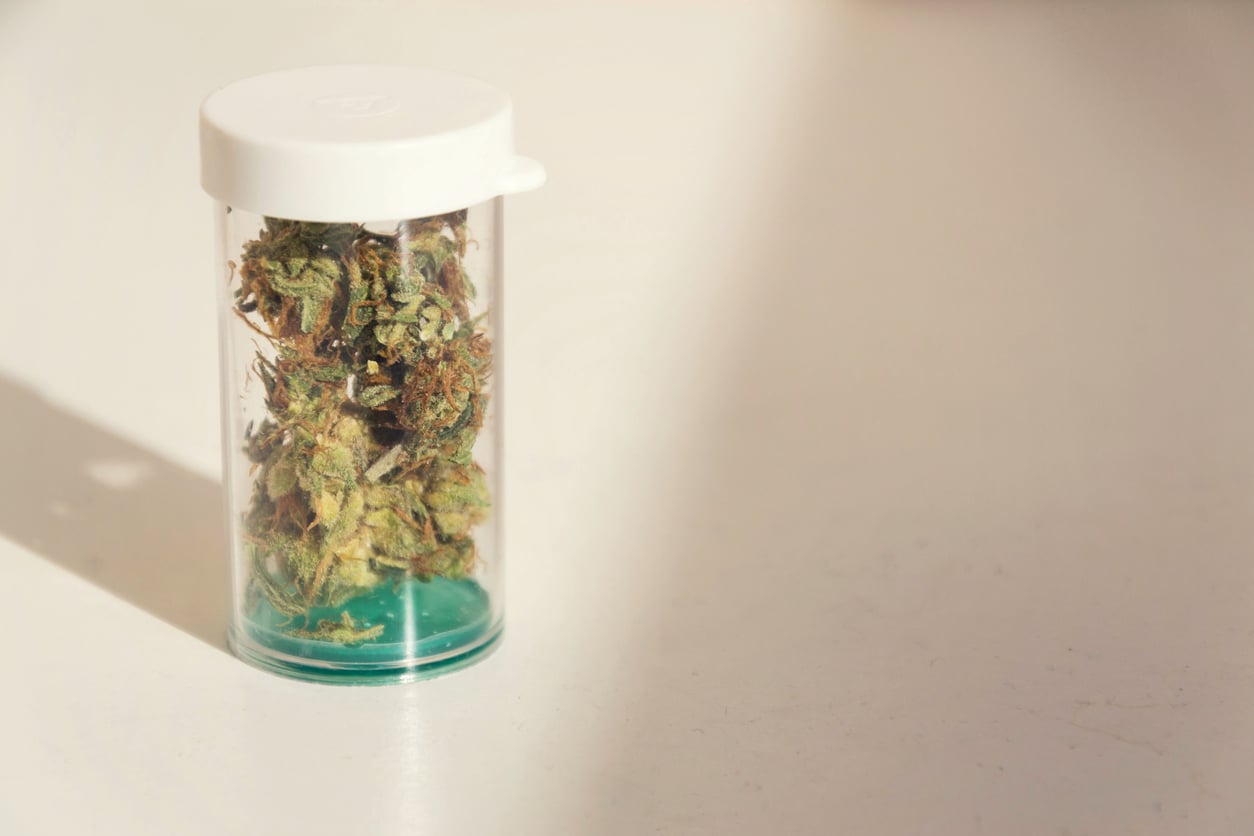A major concern for people taking marijuana is that they may become addicted to it. Thankfully, the vast majority of people can take in the benefits of cannabis without experiencing withdrawal effects or unwanted dependence consequences. A small percentage of cannabis consumers, however, develop marijuana dependence.
Research suggests that marijuana addiction depends on several factors, such as genetics, frequency of use, THC potency, and mental state. For example, people who are already struggling with substance abuse—like alcoholics—have a much higher probability of developing marijuana dependence as well.
Over 90% of people will be able to enjoy the relaxing and energizing effects of cannabis without experiencing any THC dependence. Around 9% of cannabis consumers, however, may develop an addiction to THC, which means they won’t be able to function properly without consuming marijuana. These people may require help and mental support to overcome their addiction.
What Is Marijuana Addiction?
Marijuana addiction is when you can’t work through your day without inhaling or ingesting cannabis. Most people who develop such an addiction, do so slowly. They first take cannabis as a social activity and to lessen their stress. They then become dependent on cannabis to go through their daily tasks, including work, social interactions, and relationships.
Once they realize that they can’t function without marijuana, they may start taking it on a daily basis, or even multiple times during the day.
The problem with addiction is that people find it very hard to quit their habit. The moment they stop taking marijuana, all of their problems, anxiety, and stresses return even stronger. Addicts often go back to marijuana consumption because their mental and physical pain is difficult to manage.
How Does Marijuana Addiction Manifest Itself?
Just like alcohol addiction or drug addiction, marijuana addiction manifests itself as anxiety and irritability when the person is not taking cannabis. That person can’t go through the day without inhaling or ingesting and find that they need a way to get marijuana. They often tell themselves that they can quit any time they want, even though this doesn’t conform to reality.
Marijuana addicts often hide away from friends and relatives because they don’t want to acknowledge they have a problem. This can make them become more reclusive in order to focus on their addiction.
Marijuana abuse goes hand-in-hand with THC tolerance. The brain becomes used to the presence of THC and requires ever-increasing quantities of the cannabinoid to feel its beneficial effects. Marijuana consumers thus develop tolerance and increase both the frequency of use and the quantity consumed.
What Are Marijuana’s Withdrawal Symptoms?
Marijuana’s withdrawal symptoms are similar to other addictions. When people quit taking marijuana, they may become irritable and anxious. They may experience negative moods, unexplained anger, and mood swings. They may also lose their appetite and their interest in everyday activities like work or seeing friends.
Such withdrawal symptoms may cause them to miss out on social activities, leaving them feeling increasingly isolated and alone. During such times, marijuana addicts often feel that all their problems will be solved if they take cannabis.
Why Is Marijuana Addictive?
THC is the main component of marijuana. It is the psychoactive and psychotropic component that affects the brain and a person’s mental state.
There are several theories that attempt to explain why marijuana can be addictive.
Interaction with Brain Receptors
Cannabinoid receptors are especially dense in the brain. When THC enters the body, it interacts with the endocannabinoid system and binds to its receptors. Since these receptors are mainly found in the brain, it makes sense that the effects of THC are particularly profound in that location.
Specifically, THC seems to affect brain areas that are linked to pleasure, memory, learning, sensory recognition, concentration, and thinking.
In a sense, marijuana stimulates the endocannabinoid system. In some cases, however, it seems to overstimulate it—and that’s when addiction may set in.
THC Affects Dopamine and Other Neurotransmitters
THC interacts with brain neurotransmitters, mainly dopamine and serotonin. Dopamine has been called the reward chemical because it enhances the feeling of pleasure and reward. THC increases the production of dopamine, which is why people who take marijuana feel better about themselves and get a feeling of pleasure and bliss from THC—the so-called “high.”
Higher THC Potency
For years, consumers have been asking for higher THC potency. Through selective breeding, marijuana growers have been growing strains offering just that. While 20 years ago marijuana contained 4 to 8% THC, many strains now exceed 20%. As a result, people consume much more THC in a single inhalation or with one ingestible.
Lower CBD Potency
Another market trend has been to develop strains with lower CBD potency. Studies suggest that CBD may help tone down THC’s more adverse side effects and may even help addicts overcome their addiction.
A 2018 preclinical proof-of-principle study [2] concluded that “CBD attenuated context-induced and stress-induced drug seeking without tolerance, sedative effects, or interference with normal motivated behavior.”
Unfortunately, strains that are particularly potent in THC tend to have relatively little CBD.
Who Is at Risk of Marijuana Addiction?
There is a lot of research regarding the factors that determine whether someone is at risk of developing marijuana addiction.
Genetic Causes
Research [1] suggests that people who are genetically predisposed to addiction have a higher probability of abusing marijuana. People who are already struggling with alcohol abuse, painkiller consumption, and other types of addictions are more prone to marijuana addiction.
Frequency of Use
People who use marijuana daily or weekly are more prone to developing marijuana addiction. Infrequent use or long breaks from marijuana consumption may help protect you from abuse.
Age of Consumption
People who start taking marijuana in their early teens are more susceptible to cannabis abuse than people who experiment with cannabis after their 20s. It would appear that the brain is more sensitive to phytocannabinoids in adolescents and very young adults, probably because it is still developing.
Mental Health
People who are suffering from anxiety, depression, or PTSD have more chances of experiencing marijuana abuse than people without such mental conditions. One theory is that brain chemicals are already out of balance and marijuana appears to aggravate this imbalance.
Social Interactions and Social Engagement
Anecdotal evidence suggests a close correlation between a lack of social interactions and marijuana abuse. People who are enjoying a wide social network of friends and family and have a professional and social community surrounding them seem to experience much less marijuana dependence than people who are less engaged and who lack the social network they need to keep socially active.
Will I Get Addicted to Marijuana?
Over 90% of consumers will never develop an addiction to marijuana. They take cannabis to help manage stress and anxiety and to relax their minds and bodies. Responsible marijuana consumption will not lead to addiction, just like most people who enjoy a glass of wine on occasion do so without becoming alcoholics.
However, 9% of cannabis consumers may develop a tolerance and an addiction to THC. These people may require help to manage their addiction and adopt a healthier attitude toward marijuana consumption.
Mountain Annie’s for Your Marijuana
Talk to our friendly and knowledgeable budtenders Mountain Annie’s for any questions regarding marijuana addiction. To protect yourself, you may wish to choose a marijuana strain or product with lower THC and higher CBD content. Besides edibles, tinctures, concentrates, flowers, and pre-rolls, we carry a great selection of cannabis-infused topicals such as creams, salves, soaks, transdermal patches, and more.
Our four dispensaries in Ridgway, Silverton, Durango, and Cortez are open Monday to Sunday, 8:00 am-8:00 pm. Order online and arrange to pick up your purchases whenever it suits you or drop by in person to evaluate what type of cannabis consumption best suits you and your lifestyle.
References
[1] https://onlinelibrary.wiley.com/doi/10.1111/j.1360-0443.2009.02831.x
[2] https://www.ncbi.nlm.nih.gov/pmc/articles/PMC6098033/


